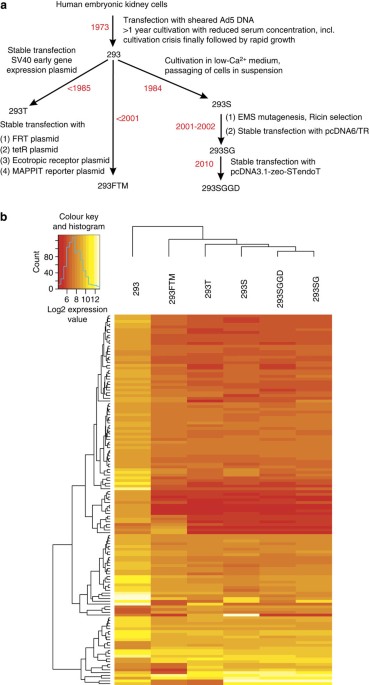Laeomis
Member
- Joined
- Nov 17, 2014
- Messages
- 211
Revelation 6: 5-6
5 And when he had opened the third seal, I heard the third beast say, Come and see. And I beheld, and lo a black horse; and he that sat on him had a pair of balances in his hand.
6 And I heard a voice in the midst of the four beasts say, A measure of wheat for a penny, and three measures of barley for a penny; and see thou hurt not the oil and the wine.
HEK293 stands for Human Embryonic Kidneys Cells. They come from an aborted baby from 1973. These cells have been cloned up to the present day for a variety of uses. Most notably for vaccine production. There are a few other cloned cells lines from other babies.

 bitesizebio.com
bitesizebio.com

 www.nature.com
www.nature.com
A company that no longer exists called Senomyx (it was bought out) ran into controversy about using them. Many companies filed patents with Senomyx like Pepsi, Coca Cola, Kraft, Nestle and more.
The HEK293 cells were used to test flavors to see if they reacted well. Then those flavors might be added to the food, but never the aborted fetal cells. This article from CBS still excellently explains the situation with many links that still work. Like links to the patents.

 www.cbsnews.com
www.cbsnews.com
The bizarre thing is, that anyone even you can buy HEK293 cells online. If you try to look for it, you won't have to look too far. I was surprised all this was legal when I first found out.
These aborted fetal cells are also used in some beauty products.
 www.washingtontimes.com
www.washingtontimes.com
Other cell lines from other aborted fetuses are used for vaccines.
 www.sciencedirect.com
www.sciencedirect.com
Revelation 2
King James Version
2 Unto the angel of the church of Ephesus write; These things saith he that holdeth the seven stars in his right hand, who walketh in the midst of the seven golden candlesticks;
2 I know thy works, and thy labour, and thy patience, and how thou canst not bear them which are evil: and thou hast tried them which say they are apostles, and are not, and hast found them liars:
3 And hast borne, and hast patience, and for my name's sake hast laboured, and hast not fainted.
4 Nevertheless I have somewhat against thee, because thou hast left thy first love.
5 Remember therefore from whence thou art fallen, and repent, and do the first works; or else I will come unto thee quickly, and will remove thy candlestick out of his place, except thou repent.
6 But this thou hast, that thou hatest the deeds of the Nicolaitanes, which I also hate.
7 He that hath an ear, let him hear what the Spirit saith unto the churches; To him that overcometh will I give to eat of the tree of life, which is in the midst of the paradise of God.
5 And when he had opened the third seal, I heard the third beast say, Come and see. And I beheld, and lo a black horse; and he that sat on him had a pair of balances in his hand.
6 And I heard a voice in the midst of the four beasts say, A measure of wheat for a penny, and three measures of barley for a penny; and see thou hurt not the oil and the wine.
HEK293 stands for Human Embryonic Kidneys Cells. They come from an aborted baby from 1973. These cells have been cloned up to the present day for a variety of uses. Most notably for vaccine production. There are a few other cloned cells lines from other babies.
HEK293 cells are Human Embryonic Kidney cells, originally isolated and grown by Dutch biologist Alex Van der Eb in the early 1970s. They were transfected with sheared adenovirus 5 (Ad5) DNA by Frank Graham, a postdoc in Van der Eb’s lab. It was his 293rd experiment, which is why they got the tag HEK293. (1)
Because of their advantages and versatility, they are the second most widely used cell line after HeLa cells, the first-ever human cell line. HEK293 cells are used in cancer research, vaccine development, protein production, signal transduction and protein interaction studies, drug testing, and receptor de-orphanization, just to list a few!

HEK293 Cells - A Guide to This Incredibly Useful Cell Line
HEK293 cells are one of the most commonly used cell lines. But what are they? Why should you use them? And what does the ‘293’ mean?
 bitesizebio.com
bitesizebio.com
The original 293 cells1,2,3 were derived in 1973 from the kidney of an aborted human embryo of unknown parenthood by transformation with sheared Adenovirus 5 DNA. The human embryonic kidney cells at first seemed recalcitrant to transformation. After many attempts, cell growth took off only several months after the isolation of a single transformed clone. This cell line is known as HEK293 or 293 cells

Genome dynamics of the human embryonic kidney 293 lineage in response to cell biology manipulations - Nature Communications
The human embryonic kidney 293 (HEK293) cell lineage is widely used in cell biology and biotechnology. Here, the authors apply whole genome resequencing methods to characterise genomic variation in six HEK293 cell lines and suggest that this variation could affect experiments using these cell lines.
A company that no longer exists called Senomyx (it was bought out) ran into controversy about using them. Many companies filed patents with Senomyx like Pepsi, Coca Cola, Kraft, Nestle and more.
The HEK293 cells were used to test flavors to see if they reacted well. Then those flavors might be added to the food, but never the aborted fetal cells. This article from CBS still excellently explains the situation with many links that still work. Like links to the patents.

Pepsi's Bizarro World: Boycotted Over Embryonic Cells Linked to Lo-Cal Soda
Pro-lifers say that a company Pepsi is collaborating with uses human embryonic kidney cells to develop its flavor enhancers -- ingredients that one day are likely to appear in low calorie soda.
What Senomyx is up to
Is this claim true? Neither Pepsi nor Senomyx returned calls, so we don't know the companies' side of the story. But a perusal of Senomyx's patents suggests that it may well be. All but 7 of the company's 77 patents refer to the use of HEK 293 (human embryonic kidney) cells, which researchers have used for decades as biological workhorses. (For the bio-geeks among you, these cells offer a reliable way to produce new proteins via genetic engineering.)
The bizarre thing is, that anyone even you can buy HEK293 cells online. If you try to look for it, you won't have to look too far. I was surprised all this was legal when I first found out.
These aborted fetal cells are also used in some beauty products.
Neither the Neocutis Web site nor its advertising makes any secret of the company’s use of fetal cell lines.
The firm’s online entries say the products were “inspired by fetal skin’s unique properties” and that the technology “uses cultured fetal skin cells to obtain an optimal, naturally balanced mixture of skin nutrients.”
“Neocutis means, literally, new skin. And who wouldn’t like to turn back time to create flawless baby skin again?” says one ad.
Aborted fetus cells used in beauty creams
A San Francisco cosmetics company has ignited an outcry among pro-lifers for including an unexpected ingredient in its anti-aging creams: skin-cell proteins from an aborted fetus.
Other cell lines from other aborted fetuses are used for vaccines.
Two cell lines, MRC-5 and WI-38, both derived from elective abortions performed in Europe in the early 1960s, have been used as cell substrates in vaccine manufacture. Four vaccines continue to require the use of these cell lines: varicella, rubella, hepatitis A, and one of the rabies vaccines. Human fetal cells were valuable in vaccine research because they support the growth of many human viruses and are sterile; they were first used at around the time that researchers found that primary monkey kidney cells were contaminated with SV40 virus.
WI-38 - an overview | ScienceDirect Topics
 www.sciencedirect.com
www.sciencedirect.com
Revelation 2
King James Version
2 Unto the angel of the church of Ephesus write; These things saith he that holdeth the seven stars in his right hand, who walketh in the midst of the seven golden candlesticks;
2 I know thy works, and thy labour, and thy patience, and how thou canst not bear them which are evil: and thou hast tried them which say they are apostles, and are not, and hast found them liars:
3 And hast borne, and hast patience, and for my name's sake hast laboured, and hast not fainted.
4 Nevertheless I have somewhat against thee, because thou hast left thy first love.
5 Remember therefore from whence thou art fallen, and repent, and do the first works; or else I will come unto thee quickly, and will remove thy candlestick out of his place, except thou repent.
6 But this thou hast, that thou hatest the deeds of the Nicolaitanes, which I also hate.
7 He that hath an ear, let him hear what the Spirit saith unto the churches; To him that overcometh will I give to eat of the tree of life, which is in the midst of the paradise of God.
Last edited: